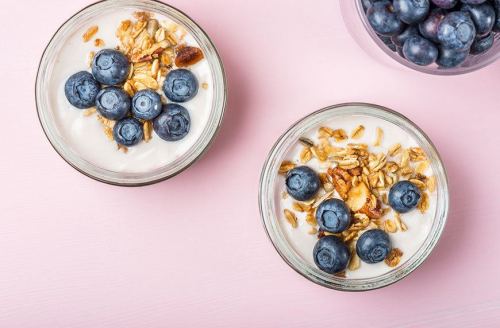Any ‘90s or early 2000s kid likely considers “Got Milk?” ads a consistent part of their childhood. Britney Spears, Mia Hamm, Austin Powers, Kermit the Frog, and the Olsen twins all proudly displayed their milk mustaches in the California Milk Processor Board’s national ad campaign. It seemed like everyone had milk.
But in the 2010s, the question became something more like, “Need milk?” People started swapping out their dairy milk for plant versions made from almond, cashew, coconut, hemp, oat, and soy for a variety of reasons—everything from going vegan, to concern over animal rights and the environment, to lactose intolerance, to just plain liking an alternative more. Non-dairy milk sales grew 61 percent between 2012 and 2017, per a 2018 Mintel market analysis. That’s come to the detriment of regular milk; while the average American drank an average of about 24 gallons of milk a year in 1996, that number went down to 17 gallons a year in 2018.
Throughout this dairy backlash, people have also really started to question: Is milk healthy? We know that lactose intolerance can create digestion issues. Studies and anecdotal stories have also claimed that dairy consumption is associated with inflammation, acne, and even cancers including ovarian and prostate. Published earlier this year, a Loma Linda University study of nearly 53,000 North American women over almost eight years observed “a potentially important positive association between dairy (especially milk) consumption and risk of breast cancer.”
Meanwhile, USDA Dietary Guidelines still encourage three cup-equivalents of dairy (including milk, but also foods like yogurt and cheese) per day for adults, although those guidelines are due to be updated sometime in 2020.
So what gives? Is milk healthy or not?
First, let’s talk about the benefits of milk and, more broadly, dairy. Milk, like other forms of dairy, offers nutrients like protein, vitamin D, and vitamin A, all of which are essential to human functioning. There is also some evidence that moderate consumption of dairy products might lower the risk of high blood pressure and colon cancer.
Most importantly, milk is a “major source of calcium,” says David Levitsky, PhD, a professor in the division of nutritional sciences at Cornell University. Calcium, of course, is an important mineral that helps keep bones and teeth strong, ensures your blood clots properly, and regulates your heart beat. Getting enough of it is crucial, especially for perimenopausal and menopausal women.
“Women, as we age, may be at risk for developing osteoporosis or bone fracture, and so having ample calcium in the diet is really beneficial,” says Vasanti Malik, ScD, an assistant professor of nutritional sciences at the University of Toronto and an adjunct assistant professor of nutrition at the Harvard T.H. Chan School of Public Health. Milk, which contains 276 milligrams of calcium per cup serving, can be an easy way to hit the current target of 1000 to 1200 milligrams per day recommended by the National Institutes of Health.
Not sure if you’re into milk? Here’s the lowdown on all the best non-dairy alternatives:
As far as the possible negatives of consuming dairy and/or milk, the evidence just isn’t fully there yet for a lot of it, experts say. “The field of nutrition is very complex, and literally everything that people eat a lot of is under investigation, and depending upon confounding factors and methodologies, it is not unusual to find evidence on both sides,” points out Barbie Boules, RDN, founder of Longevity Nutrition. “So, until we really have evidence that strongly says tens of thousands of people have been studied all coming to the same conclusion under the same methodology, it’s really difficult to say this causes this or this prevents this.”
Translation: We still haven’t definitively proven a lot of milk (and dairy’s) scarier alleged downsides. There is mixed evidence, for example, that dairy products such as milk cause inflammation. (There is a decent amount of evidence that dairy consumption is associated with increased risk of acne, however.) Despite the above-mentioned Loma Linda study connecting milk and breast cancer, it’s important to note that it only looked at association, not causation (meaning that we don’t know if one causes the other) and it discussed relative risk, not absolute risk—making the actual potential risk of breast cancer associated with drinking milk way, way smaller IRL.
One proven downside of eating or drinking too much dairy, says Malik, is that it’s high in saturated fat. Excess saturated fat intake is a factor in cardiovascular disease and other heart problems, making the need for balance important.
Should I still drink milk?
None of these broad studies take into account the reality that everyone responds to food a bit differently than others. If you know that your face flares up with pimples or you wake up feeling super bloated after you drink a lot of milk, then by all means incorporate that information into your eating habits. “Each of us is physiologically unique, and none of us reacts exactly the same way to what we eat, which is kind of what makes nutrition counseling both exciting and very complicated and difficult,” says Boules.
With all of that in mind, experts agree that, if milk is one of your calcium sources of choice, go ahead and continue drinking it. “If women like milk and it’s something that they’re used to, they enjoy it, then that’s absolutely fine. They can stick with it,” says Malik. “You want to balance potential benefits with potential risks related to the saturated fat, and about two servings [of dairy] per day seems to be kind of the sweet spot,” she says. (FYI: That’s a bit less than the three servings per day that the Dietary Guidelines currently recommends.)
But, Malik adds, “I don’t recommend people consume dairy unless it’s something that they enjoy because, really, you can get the nutrients elsewhere.” She says sources of calcium, for example, include dark, leafy greens, legumes, and beans, as well as fortified foods, like orange juice and cereals.
While Boules believes that, as long as your body doesn’t reject it, there’s room for every food in a healthy diet, one issue she has with milk is the fact that it’s a liquid. “If there’s one thing I can get my people to do, it’s to not drink their calories,” she says. So as far as dairy foods go, Boules is a much bigger fan of yogurt than milk, usually recommending no more than about a cup of the stuff per day.
“I absolutely do recommend yogurt to a lot of people for the calcium, for the protein, and for the probiotic qualities,” she says. “I think that, ounce per ounce, yogurt just packs a lot more nutrient density and satiety.” One caveat: Be mindful of yogurt’s sugar content, and ideally opt for plain that you can sweeten yourself, she says.
The moral of the milk story, for now at least: If you like drinking it, go for it within reason. If you don’t, there’s no reason to start now.
Speaking of confusing nutritional topics…are eggs healthy? And what about meat?
Sign Up for Our Daily Newsletter
Get all the latest in wellness, trends, food, fitness, beauty, and more delivered right to your inbox.
Got it, you've been added to our email list.











